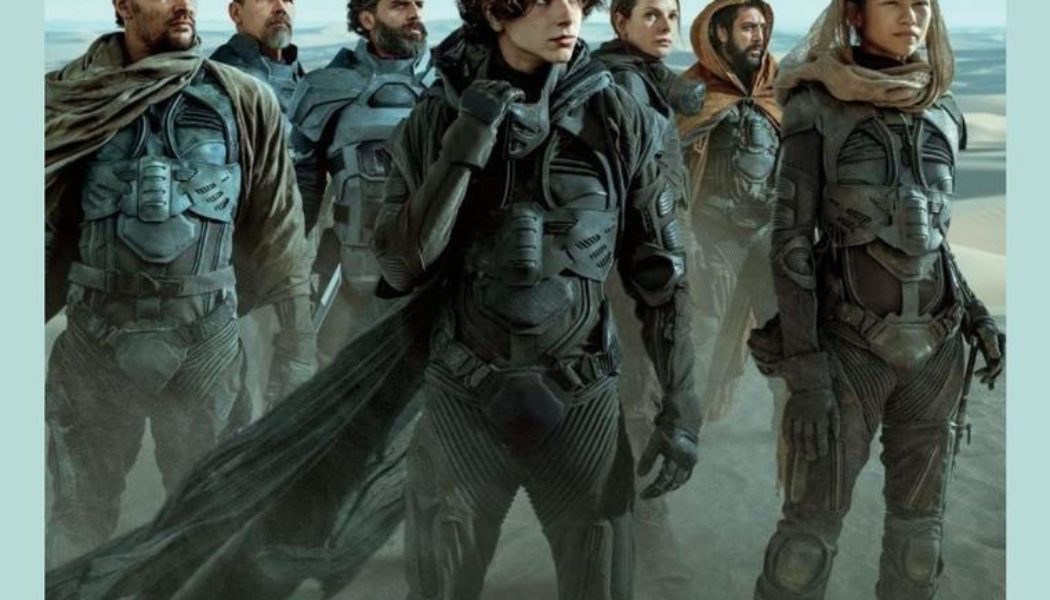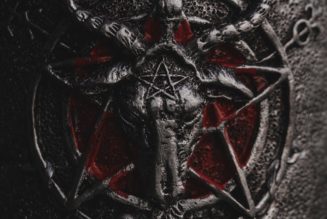
A work like Denis Villeneuve’s Dune (or Dune: Part One) is almost two movies, offering radically different experiences (or ranges of experiences) to two audiences: those familiar with the universe of Frank Herbert’s landmark science-fiction novels and those coming to the film, as I did, more or less cold.
Those two broad groups can of course be further broken down in any number of ways, but this basic divide is sufficiently emphatic that in the last few weeks I’ve been repeatedly asked by longtime Dune fans, who can’t imagine how the film would play to someone unfamiliar with the source material, whether I thought Villeneuve’s film works on its own.
Watching Dune drove home to me the extent to which no one in 2021 can really go into an adaptation of Dune completely cold. Not if they know, above all, the Star Wars movies, or Hayao Miyazaki’s Nausicaä of the Valley of the Wind, or even Tremors, not to mention the long trend of “Chosen One” narratives peaking in The Matrix and Harry Potter movies. Nor, for that matter, if they have any familiarity with Herbert’s own influences, from Edgar Rice Burroughs’ Mars stories to Isaac Asimov’s Foundation series.
Dune has long had a reputation for being “unfilmable,” not in the a priori sense that, say, J.R.R. Tolkien’s The Silmarillion or James Joyce’s Ulysses might be considered unfilmable due to their unusual formal qualities, but in a de facto sense, given the varying failures of high-profile efforts to adapt the dense novel for the screen.
The train-wreck fascination of Alejandro Jodorowsky’s legendary 1970s Dune project, a wildly ambitious undertaking that never got out of development hell, made for a compelling 2013 nonfiction movie, Jodorowsky’s Dune. Then there’s the messy failure of David Lynch’s controversial 1984 adaptation, a flop panned by critics and disowned by Lynch over interference from producers.
So far I’ve watched Villeneuve’s film twice: the first time just to try to take it in, and the second, after catching up with Lynch’s version as a point of comparison and contrast, to get at least some sense of Villeneuve’s contributions to the material. My main takeaway is that, while I’m not convinced I want to commit to plowing through the novel’s 800 or whatever pages, I’m eager to watch Villeneuve’s film again. I well understand, though, some of the reasons this response is far from universal. Dune is one of those rare films that can reasonably be held to justify fully both the worst and the best that can be said about it.
Solemn, portentous, dense with political and economic themes, and largely lacking in human warmth or humor, the film is tonally closer to the Star Wars prequel trilogy than the original trilogy. Yet the political and economic themes are at home in this bleak, messy universe in a way they never were in Star Wars’ fairy-tale world. As for the rest, here’s a funny thing: For the most part the tonal limitations of each Star Wars prequel came to bother me only after the next film came out and I realized how ineptly the films functioned as a series, both on their own and in relation to the original trilogy. Villeneuve knows, it seems, exactly where he’s going — and, for some viewers at least, how to make the trip worthwhile.
Dune dramatizes the familiar maxim of Carl von Clausewitz that war is a continuation of politics by other means, along with the supplementary truism that politics is a continuation of economics by other means. Supply and demand, and the ability to control them, makes the galaxy go round, and the strong do what they can while the weak suffer what they must (to cite another relevant maxim).
In the world of Dune, this means that the natives of the harsh desert planet Arrakis — a nomadic, Bedouin-like people called the Fremen — endure foreign occupation and administration of their planet by interstellar powers who come to harvest the rarest and most valuable substance in the universe: melange or “spice.” A psychotropic drug that doesn’t just give users a feeling of expanded consciousness, but can actually unlock precognitive powers, spice enables specially trained prescient users to pilot interstellar distances, giving the substance a value one writer compared to cocaine and petroleum combined.
The film opens amid a transfer of power. (A misleading opening title gives the year as 10190, but fails to specify that the schema is not A.D., but “A.G.,” after the founding of the Space Guild; the story is actually set roughly 20,000 years in the future.)
By imperial edict, oversight of spice-mining operations on Arrakis is being passed from powerful House Harkonnen to a rival power, House Atreides — a transition the aggrieved Fremen reasonably expect to make no difference. (Meet the new boss, same as the old boss. For some reason this movie puts me in mind of a lot of maxims.) Actually, the leader of House Atreides, Duke Leto the Just (Oscar Isaac), is about as honorable and fair-minded as an imperialist can be, and certainly a more reasonable man than the ruthless Baron Vladimir Harkonnen (Stellan Skarsgård). More important in the long run, though, is Leto’s son, young Paul Atreides (Timothée Chalamet).
As a Chosen One narrative, Dune is structured, almost presciently, as a critique or subversion in advance of the many cinematic Hero’s Journey mythologies that followed in its wake. Unlike orphaned Luke Skywalker and Harry Potter, raised in obscurity while dreaming of more, Paul Atreides is the privileged, conflicted heir of two lofty birthrights by which he seems more burdened than empowered.
From his father Paul will presumably inherit leadership of House Atreides and responsibility for their planetary fief of Caladan, and perhaps for Arrakis as well. But Paul’s mystical mother, Lady Jessica (Rebecca Ferguson) — Duke Leto’s concubine and a high-ranking member of a powerful, quasi-religious sisterhood called the Bene Gesserit — may have bequeathed him even greater potential. Jessica hopes Paul may be a long-hoped-for figure of unparalleled powers called the Kwisatz Haderach: not a messiah foreseen in legends or prophecies, ordained by fate or providence, but the ultimate outcome of centuries of selective breeding orchestrated by the Bene Gesserit.
There’s a deconstructionist take on religion at work here. The film doesn’t throw out syncretic labels like “Navachristianity” or “Zensunni,” nor do we hear about the “14 sages” or the “Orange Catholic Bible,” an anthology curated from humanity’s great sacred texts. We are given to understand, though, that messianic expectations among the Fremen regarding a prophetic figure variously called Mahdi (an actual Islamic messianic term) or Lisan al-Gaib (said to mean “voice from the outer world”) have been planted in their culture by the Bene Gesserit. Dune also deconstructs the role of religion in so-called religious wars, underscoring the political and economic motives under the religious language.
Beneath the deconstruction are religious roots of various kinds. Herbert’s family was Catholic, and his maternal aunts saw to it that he got a Jesuit education. Herbert has described the Bene Gesserit as “female Jesuits,” a sort of mashup of his aunts and the order he associated with them. (The name is also similar to the Hebrew term B’nai Jeshurun, meaning “sons/children of the righteous.” That may be a coincidence, but the term Kwisatz Haderach is certainly derived from the Hebrew phrase Kefitzat Haderech meaning something like “a jump of the road” or “contracting the path,” and having a sense of miraculous or instantaneous travel.) Other terms are drawn from Hebrew and Arabic, as well as other languages.
Both Duke Leto and Lady Jessica do what they can to help Paul find his way, though their affection for their son goes beyond their hopes for his potential. For his part, Paul is diffident about his lofty heritage and often seems too tired or not in the mood to practice the skills that go with them, from sword-fighting to use of the Voice, a Bene Gesserit skill capable of overriding the will of others. Not that those around Paul typically let him get away with indulging his reluctance. Some are born great, some achieve greatness and some have greatness thrust upon them: three paths that converge, perhaps, in Paul Atreides.
The subversion of the Chosen One motif is accented by the casting of Chalamet, with his slight build and delicate features. An early shot pointedly silhouettes Paul’s beanpole figure next to the slab-like outline of swordmaster Duncan Idaho, played by Jason Momoa with a breezy insouciance especially welcome in this earnest affair.
Duncan gently teases Paul over his puny arms. Much later, when Paul finally begins to reach for his destiny, he is repeatedly scoffed at as a “little boy” or a “lost boy hiding in a hole in the ground.” It will take some doing for this unimpressive child of privilege to make good — a process that begins in this movie, though the real payoff awaits part two.
This is a weary, decadent world, perhaps beyond even the power of the Kwisatz Haderach to save. The emperor fears both House Atreides and House Harkonnen, and has pitted them against each other in the hope of weakening both rival powers. This is no good-vs.-evil myth or fairy tale, although the story’s anti-imperalist and Islamophilic sympathies are solidly with the Fremen. (Despite the disanalogies to Star Wars, the parallels are eye-opening for this Dune newcomer: a corrupt galactic empire; a mystic society with precognitive powers and an ability to command the wills of others; a desert planet; predators who dwell beneath the surface; tribal desert people here evoking Tusken Raiders but later, perhaps, inspiring the tribal Ewoks rising up against Imperial forces; a morbidly obese [robber] baron; etc.).
For fans of the novel, one of the film’s great pleasures, it seems, is that it finally feels like the novel brought to the screen. Villeneuve’s Dune is not a bold reimagining or reworking of the story; he has simply filmed the unfilmable, and, as far as it goes, that’s enough.
For me, questions of theme, character and story, while not without interest, are ultimately overshadowed, if not overwhelmed, by the sheer ambition and scale of the movie’s visual and audio design. Watching Eternals after seeing Dune, I was struck by the paltriness of conceptually similar images like immense spacecraft hanging in the air. Even when a creature far larger than a sandworm begins to erupt from the Earth’s surface in Eternals, it lacks the emotional weight and sense of awe around the sandworm’s immense maw, like the mouth of a hookworm lined with barbs like teeth crossed with baleen.
Like Villeneuve’s Blade Runner 2049, Dune draws inspiration from Brutalism — an architectural aesthetic tending to evoke both power and soullessness — not only in for its soaring, slab-like architecture but also for its immense, wedge-shaped or cylindrical space vessels.
While Brutalism in the real world is seldom to my tastes, onscreen it can create images of heart-stopping imaginative force. Along with the bright, remorseless sands of the Arrakian desert and the sepulchral creaking sounds emerging from the immense sandworms, the very shape and textures of the vast surfaces rising around the pitifully small human characters help define the world of Dune as one in which I very much would not want to live, but which I find unforgettable.
Borrowing a maxim from the Dutch philosopher and clergyman Gerard van der Leeuw (The Conquest of Illusion), Dune reminds us, “The mystery of life is not a problem to be solved, but a reality to be experienced.” So is art.
CAVEAT SPECTATOR: Intermittent intense, stylized violence; a depiction of concubinage; brief nonsexual, non-explicit nudity; brief cursing and crude language. Teens and up.
This story was updated after posting.
Join Our Telegram Group : Salvation & Prosperity









